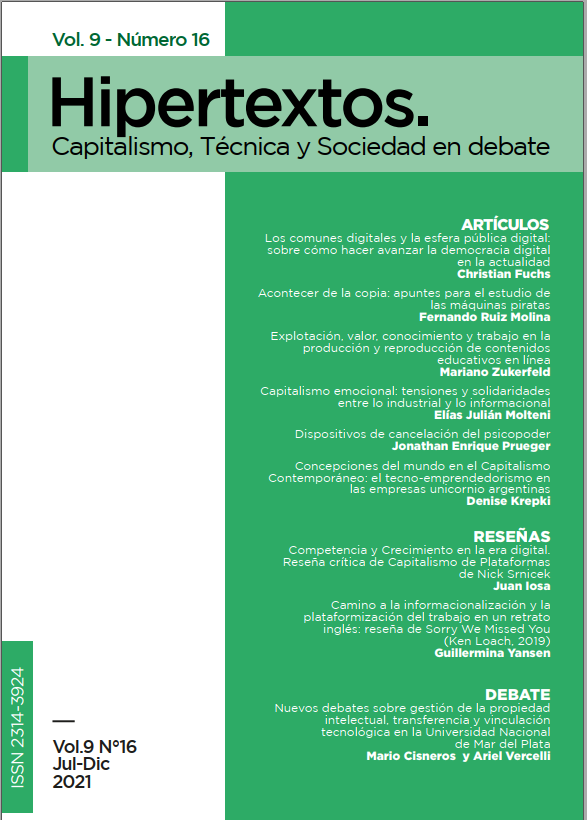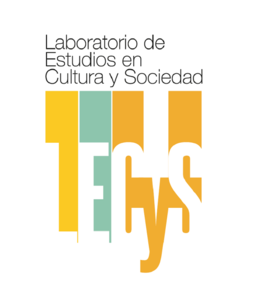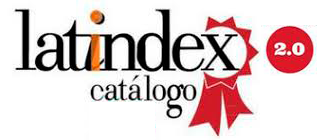The digital commons and the digital public sphere: how to advance digital democracy today
how to advance digital democracy today
DOI:
https://doi.org/10.24215/23143924e038Keywords:
digital commons, digital public sphere, digital capitalism, public service media, platformsAbstract
This paper asks: what are the democratic potentials of the digital commons and the digital public sphere? First, the article identifies ten problems of digital capitalism. Second, it engages with the notion of the digital public sphere. Third, it outlines the concept of the digital commons. Fourth, some conclusions are drawn and ten suggestions for advancing digital democracy are presented.
This article contributes to theorising and the analysis of digital capitalism, Internet platforms, the digital public sphere, the digital commons, digital democracy, public service Internet platforms, civil society/community Internet platforms, platform cooperatives, open access, corporate/capitalist open access, and diamond open access. This work also outlines ten problems of digital capitalism as well as ten principles of digital progressivism, a politics that advances the public sphere and the commons and thereby (digital) democracy in society.
There are natural, economic, political, and cultural dimensions of the commons and the digital commons. Capitalism, public service, and civil society media/community media/cooperatives are three forms of organisation and governing the Internet and digital media/technologies. Capitalism colonises and commodifies the (digital) commons and the (digital) public sphere. Alternative models are located outside of capitalism in the realms of the public sphere and civil society as well as their interactions.
Downloads
References
Bauwens, M., Kostakis, V., & Pazaitis, A. (2019). Peer to Peer: The Commons Manifesto. London: University of Westminster Press. DOI: https://doi.org/10.16997/book33
Benkler, Y. (2006). The Wealth of Networks: How Social Production Transforms Markets and Freedom. New Haven, CT: Yale University Press.
Benkler, Y. (2013). Commons and growth: The essential role of open commons in market economies. University of Chicago Law Review, 80, 1499–555.
Berlinguer, M. (2020). New commons: Towards a necessary reappraisal. Popular Communication, 18(3), 201–15. DOI: https://doi.org/10.1080/15405702.2020.1781857
Birkinbine, B. J. (2020). Incorporating the Digital Commons: Corporate Involvement in Free and Open Source Software. London: University of Westminster Press. DOI: https://doi.org/10.16997/book39
Broumas, A. (2020). Intellectual Commons and the Law: A Normative Theory for Commons-Based Peer Production. London: University of Westminster Press. DOI: https://doi.org/10.16997/book49
Cody, S. (2008). After Kelly: ‘After Dark’, David Kelly and lessons learned. Lobster, 55.
Der Standard. (2001). Der ‘Club 2’ ging vor 25 Jahren erstmals auf Sendung. Der Standard Online, 5 October. Available at: www.derstandard.at/story/733146/der-club-2-ging-vor-25-jahren-erstmals-auf-sendung (last accessed 7 October 2020).
Euler, J. (2018). Conceptualizing the commons: Moving beyond the goods-based definition by introducing the social practices of commoning as vital determinant. Ecological Economics, 143, 10–16. DOI: https://doi.org/10.1016/j.ecolecon.2017.06.020
Fuchs, C. (2014a). Digital prosumption labour on social media in the context of the capitalist regime of time. Time & Society, 23(1), 97–123. DOI: https://doi.org/10.1177/0961463X13502117
Fuchs, C. (2014b). Social media and the public sphere. tripleC: Communication, Capitalism & Critique, 12(1), 57–101. DOI: https://doi.org/10.31269/triplec.v12i1.552
Fuchs, C. (2018a). Digital Demagogue: Authoritarian Capitalism in the Age of Trump and Twitter. London: Pluto. DOI: https://doi.org/10.2307/j.ctt21215dw
Fuchs, C. (2018b). The Online Advertising Tax as the Foundation of a Public Service Internet. London: University of Westminster Press. DOI: https://doi.org/10.16997/book23
Fuchs, C. (2020a). Communication and Capitalism: A Critical Theory. London: University of Westminster Press. DOI: https://doi.org/10.16997/book45
Fuchs, C. (2020b). Nationalism on the Internet: Critical Theory and Ideology in the Age of Social Media and Fake News. New York: Routledge. DOI: https://doi.org/10.4324/9780429343476
Fuchs, C. (2021). Social Media: A Critical Introduction, 3rd edition. London: Sage.
Fuchs, C., & Sandoval, M. (2013). The diamond model of open access publishing: Why policy makers, scholars, universities, libraries, labour unions and the publishing world need to take non-commercial, non-profit open access serious. tripleC, 11(2): 428–43. DOI: https:// doi.org/10.31269/triplec.v11i2.502
Habermas, J. (1989). The Structural Transformation of the Public Sphere. Cambridge, MA: MIT Press.
Hardt, M., & Negri, A. (2017). Assembly. Oxford: Oxford University Press.
Harvey, D. (2005). A Brief History of Neoliberalism. Oxford: Oxford University Press. DOI: https://doi.org/10.1093/oso/9780199283262.001.0001
Held, D. (2006). Models of Democracy. Cambridge: Polity.
Hess, C., & Ostrom, E. (2007). Understanding Knowledge as Commons: From Theory to Practice. Cambridge, MA: MIT Press. DOI: https://doi.org/10.7551/mitpress/6980.001.0001
Knoche, M. (2020). Science communication and open access: The critique of the political economy of capitalist academic publishers as ideology critique. tripleC: Communication, Capitalism & Critique, 18(2): 508–34. DOI: https://doi.org/10.31269/triplec.v18i2.1183
Köhler, B., David, S., & Blumtritt, J. (2010). The slow media manifesto. Available at: http:// en.slow-media.net/manifesto (last accessed 2 November 2019).
Marx, K. (1867) [1990]. Capital. Volume 1. London: Penguin.
Marx, K. (1894) [1992]. Capital. Volume 3. London: Penguin.
Marx, K., & Engels, F. (1848) [1976]. Manifesto of the Communist Party. In Marx and Engels Collected Works (MECW) Volume 6 (pp. 477–519). London: Lawrence and Wishart.
Papadimitropoulos, V. (2020). The Commons: Economic Alternatives in the Digital Age. London: University of Westminster Press. DOI: https://doi.org/10.16997/book46
Rauch, J. (2018). Slow Media. Why Slow’ is Satisfying, Sustainable, and Smart. Oxford: Oxford University Press.
Rosa, H. (2013). Social Acceleration: A New Theory of Modernity. New York: Columbia University Press. DOI: https://doi.org/10.7312/rosa14834
Sandoval, M. (2020). Entrepreneurial activism? Platform co-operativism between subversion and co-optation. Critical Sociology, 46(6), 801–17. DOI: https://doi.org/10.1177/0896920519870577
Scholz, T. (2016). Platform Cooperativism: Challenging the Corporate Sharing Economy. New York: Rosa Luxemburg Stiftung.
Scholz, T. (2017). Uberworked and Underpaid: How Workers Are Disrupting the Digital Economy. Cambridge: Polity Press.
Scholz, T., & Schneider, N. (Eds.) (2016). Ours to Hack and to Own: The Rise of Platform Cooperativism, a New Vision for the Future of Work and a Fairer Internet. New York: OR Books. DOI: https://doi.org/10.2307/j.ctv62hfq7
Splichal, S. (2007). Does History Matter? Grasping the Idea of Public Service at its Roots In G. F. Lowe & J. Badoel (Eds.), From Public Service Broadcasting to Public Service Media, RIPE@2007 (pp. 237–56). Gothenburg: Nordicom.
Srnicek, N. (2017). Platform Capitalism. Cambridge: Polity Press.
Utman, J. S. (2020). Subversive communication against neoliberalism. Popular Communication, 18(3), 155–69. DOI: https://doi.org/10.1080/15405702.2020.1781858
Žižek, S. (2010). How to Begin From the Beginning. In C. Douzinas & S. Žižek (Eds.), The Idea of Communism (pp. 209–26). London: Verso.
























